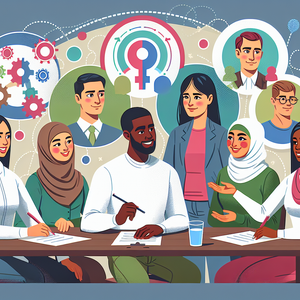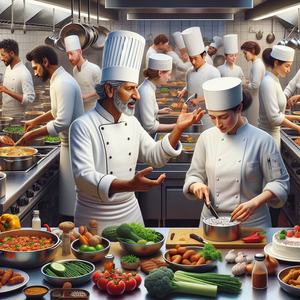Dining in 2050: What Your Waiter Could Look Like

In 2050, the traditional role of a waiter may become a shared responsibility between humans and machines. This hybrid model could revolutionize the way restaurants operate, balancing the emotional intelligence of human staff with the efficiency of cutting-edge robotics. For instance, a human waiter might greet you at the door, equipped with augmented reality (AR) glasses that instantly display your dining history, preferences, and any dietary restrictions. Meanwhile, robotic assistants could handle repetitive or labor-intensive tasks such as delivering food, refilling drinks, or clearing plates. This division of labor would allow human staff to focus on building meaningful interactions with guests, while robots handle the behind-the-scenes work. Not only would this hybrid approach enhance efficiency, but it would also elevate the overall dining experience, blending the best of human warmth and technological precision.
Artificial Intelligence: Predicting and Enhancing Your Experience
AI is poised to play a central role in the dining experience of 2050, particularly in predicting and meeting customer needs even before they are voiced. Imagine walking into a restaurant where an AI-powered system analyzes your mood using tools such as facial recognition or voice tone analysis. Based on this data, the system could make meal suggestions tailored to your emotional state. AI's capabilities would extend beyond individual interactions to optimize restaurant operations on a larger scale. For diners, the result would be shorter wait times, faster service, and an experience that feels almost magically intuitive.
Augmented Reality: A Feast for the Senses
Augmented reality (AR) could add an entirely new dimension to dining by 2050, revolutionizing how diners interact with food and their environment. Instead of flipping through a traditional menu, guests might don AR glasses or use table-mounted projections to view 3D holograms of menu items. These holograms could provide comprehensive details, such as portion sizes, ingredient lists, nutritional information, and even short animations showing how the dish is prepared. AR technology could also transform the ambiance of a restaurant, allowing guests to customize their surroundings and create a multi-sensory experience.
The Waitstaff of the Future: Experience Designers
As technology takes over routine tasks, the role of human waitstaff is likely to evolve into something more specialized. By 2050, waiters could become 'experience designers,' combining their expertise in hospitality with advanced technological tools to craft unforgettable dining experiences. These professionals might orchestrate every element of a guest’s visit, from lighting and music to the timing of each dish. To succeed in these roles, future hospitality workers would need a mix of soft skills like communication and emotional intelligence, as well as technical skills such as AR design, AI systems management, and customer psychology.
Ethical and Social Considerations
While the prospect of dining in 2050 is undoubtedly exciting, it also raises important ethical and social questions. One major concern is the potential loss of jobs due to automation. As robots and AI take over many tasks traditionally performed by human staff, will there still be a place for workers in the service industry? Another consideration is data privacy. For AI systems to provide personalized recommendations, they would need to collect and analyze vast amounts of personal data. Restaurants will need to be transparent about how this data is used and stored to build trust with their customers.
By 2050, dining out could be an entirely new experience, blending human warmth with technological innovation to create something truly extraordinary. However, as we embrace these advancements, we must also consider their broader implications. Technology should enhance, not replace, the human connections that make dining special. By finding the right balance between innovation and tradition, the restaurant industry can pave the way for a future where dining out is not just a meal, but an experience that delights all the senses and leaves lasting memories.
Augmented Reality Experience Designer
Meta, Microsoft, or innovative restaurant groups specializing in experiential dining
Responsibilities
Develop and implement AR-based dining experiences, including interactive menus, virtual table settings, and immersive restaurant themes.
Collaborate with chefs and hospitality staff to align AR visuals with culinary storytelling and restaurant branding.
Requirements
Proficiency in AR development tools (e.g., Unity, Unreal Engine) and knowledge of design software like Adobe Creative Suite required.
AI-Driven Customer Experience Specialist
High-tech hospitality brands or AI companies like OpenAI or IBM Watson
Responsibilities
Analyze customer data using AI tools to create hyper-personalized dining recommendations and optimize restaurant workflows.
Work with AI systems to predict customer needs (e.g., mood-based menu suggestions, dietary accommodations) and enhance operational efficiency.
Requirements
Strong background in AI software, data analysis, and customer psychology is essential.
Robotic Systems Operations Manager
Boston Dynamics, SoftBank Robotics, or innovative restaurant chains
Responsibilities
Oversee the deployment and maintenance of robotic waitstaff and kitchen assistants in high-tech dining establishments.
Ensure seamless integration of robotics with human staff workflow and troubleshoot issues in real-time.
Requirements
Requires expertise in robotics engineering, sensor technology, and familiarity with automation platforms.
Sustainable Food Technology Specialist
Startups in food tech or eco-conscious restaurant brands like Sweetgreen or Impossible Foods
Responsibilities
Develop and implement sustainable food systems, including AI-driven inventory management, waste reduction, and lab-grown food production for restaurants.
Collaborate with chefs and suppliers to integrate technology into sustainable sourcing and preparation practices.
Requirements
Knowledge of food science, AI tools, and environmental policies required.
Hospitality Futurist
Think tanks, consulting firms, or forward-thinking hospitality groups like Marriott or Accor
Responsibilities
Research and forecast trends in dining technology, customer behavior, and hospitality innovation.
Advise restaurants on integrating emerging technologies like AR, AI, and robotics while preserving human-centered dining experiences.
Requirements
Requires a mix of market research skills, trend analysis, and expertise in hospitality management.


